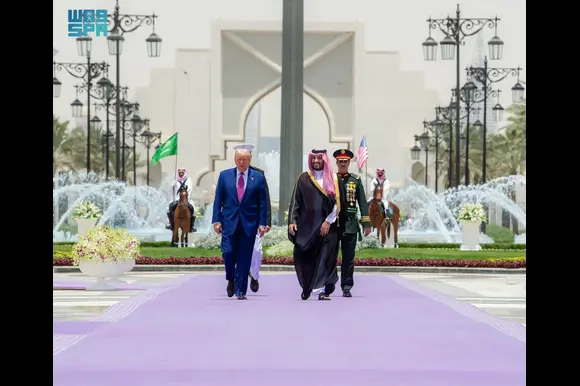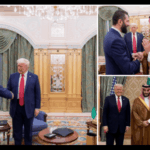U.S. President Donald Trump has secured a substantial commitment from Saudi Arabia to invest $600 billion in the United States, as he began his tour of Gulf states with a high-profile visit to Riyadh on Tuesday. Trump was greeted with a grand welcome by Saudi Crown Prince Mohammed bin Salman (MbS), with whom he later signed wide-ranging agreements on energy, defence, mining, and various other sectors.
Trump appeared jubilant as he exited Air Force One, punching the air in triumph. The Saudi crown prince, who personally welcomed him, later signed a host of strategic deals during the U.S.-Saudi Investment Forum. These agreements include a U.S. arms package valued at nearly $142 billion, hailed by the White House as the “largest defense cooperation agreement” in American history. The package spans contracts with over a dozen U.S. defence contractors, covering domains such as air and missile defence, aerospace, maritime security, and communications technology.
During the investment forum, Prince Mohammed bin Salman announced that the kingdom hoped for investment projects worth $600 billion, with $300 billion in deals already signed. He added that a second phase of talks would follow in the coming months, aiming to expand the total value to $1 trillion. Saudi Arabia, one of the top buyers of U.S. arms, continues to be a key strategic partner in the region.
Trump praised the relationship, saying, “I really believe we like each other a lot,” during a meeting with MbS, Saudi Arabia’s de facto leader. The two discussed possible Saudi procurement of Lockheed Martin’s F-35 fighter jets, though it remains unclear if the aircraft were part of the current agreements.
Joining Trump on this trip are several high-profile American business leaders, including Tesla and SpaceX CEO Elon Musk. Trump is scheduled to continue his Middle East tour with visits to Qatar on Wednesday and the UAE on Thursday. His itinerary notably excludes Israel, a move that has raised questions regarding the U.S.’s current diplomatic priorities in the region.
At the forum, Saudi Investment Minister Khalid al-Falih emphasized the evolving nature of U.S.-Saudi economic ties: “While energy remains a cornerstone of our relationship, the investments and business opportunities in the kingdom have expanded and multiplied many, many times over.” He underscored the positive impact of bilateral partnerships, stating that “great things happen” when Saudis and Americans collaborate.
Trump engaged with several top Saudi figures, including Yaser al-Rumayyan, head of the kingdom’s sovereign wealth fund; Amin Nasser, CEO of Saudi Aramco; and al-Falih himself. He toured a presentation hall featuring elaborate models of Saudi Arabia’s major development initiatives. Among the American executives in attendance were BlackRock CEO Larry Fink, Blackstone CEO Stephen A. Schwarzman, and OpenAI CEO Sam Altman. Musk, too, was seen conversing with Trump and MbS during a reception at the royal palace.
MbS’s Vision 2030 plan aims to diversify the Saudi economy and reduce its dependence on oil, which still accounted for 62% of government revenues last year. The ambitious initiative includes mega-projects like NEOM, a futuristic city planned to be as large as Belgium. However, the kingdom has had to temper some of its goals due to rising costs and fluctuating oil prices.
The U.S.-Saudi alliance remains rooted in a longstanding arrangement: Saudi Arabia ensures a stable oil supply, and the United States provides military and political support. Relations between MbS and Trump have been notably stronger than with President Joe Biden, particularly after the 2018 killing of journalist Jamal Khashoggi. While U.S. intelligence has linked the killing to the crown prince, MbS denies involvement.
Although Trump chose not to include Israel on this trip, he has expressed a desire for Israeli Prime Minister Benjamin Netanyahu to agree to a new ceasefire in Gaza. Israeli officials have downplayed the omission, but concerns are growing in Tel Aviv about their place in Washington’s agenda—especially as frustration grows in the U.S. over the ongoing 19-month Gaza conflict.
Military operations by Israel against Hamas and Hezbollah, including assassinations of key leaders in the Iran-aligned groups, have arguably strengthened Trump’s negotiating position in the region by weakening Tehran’s influence.
At the same time, U.S. and Iranian officials recently met in Oman to discuss the future of Iran’s nuclear program. Trump, however, has warned that if diplomacy fails, military action remains on the table.
Trump’s Middle East envoy, Steve Witkoff, stated last week that the administration expects imminent progress on expanding the Abraham Accords—the normalization agreements between Israel and several Arab nations—initially brokered during Trump’s previous term. However, Netanyahu’s refusal to commit to a permanent ceasefire or the establishment of a Palestinian state casts doubt on the likelihood of Saudi Arabia joining the accords anytime soon.






